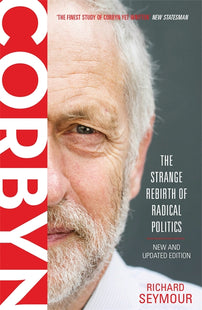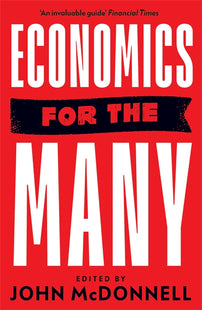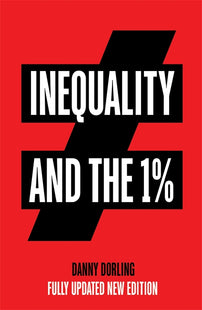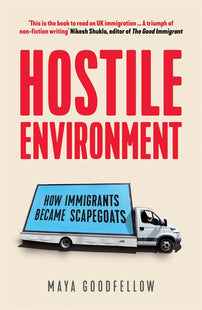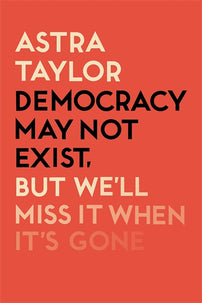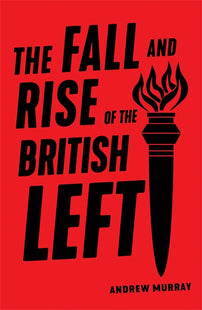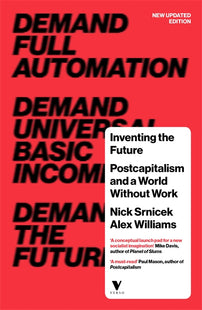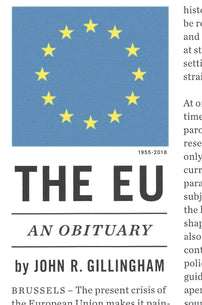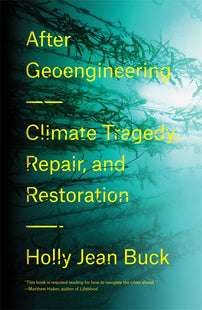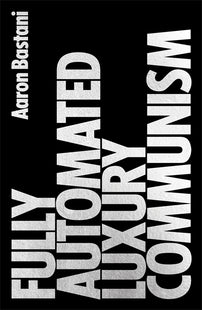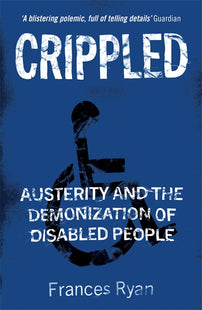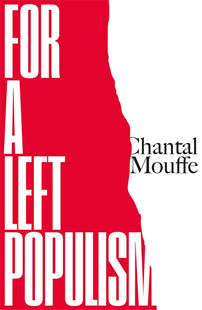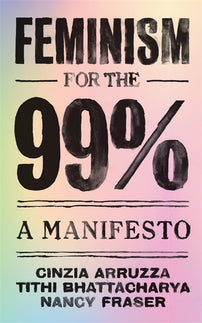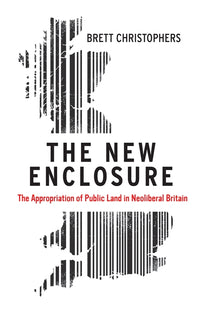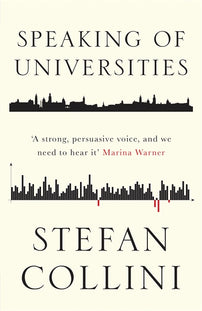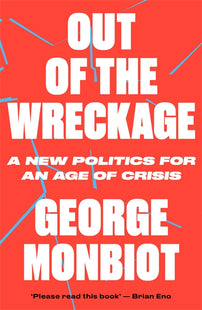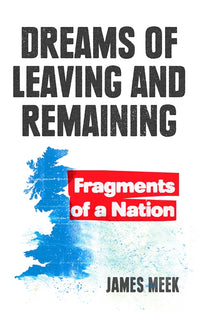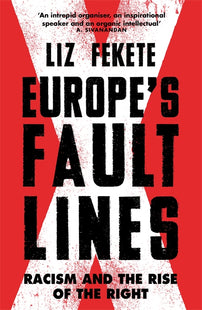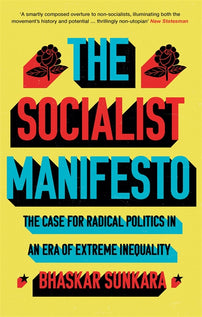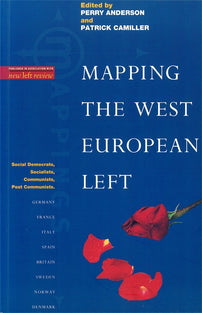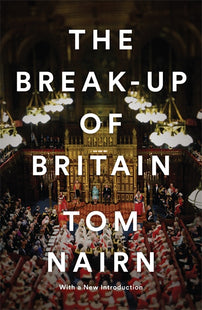General Election 2019: A Verso Reading List
Another future is possible.

In the words of Jeremy Corbyn: this election is a once in a generation opportunity for genuine change. Over the past years our authors at Verso – experts in their fields, passionate advocates for change, leading commentators - have been developing strategies and ideas to combat years of austerity and neglect. From Ann Pettifor's The Case for the Green New Deal to John McDonnell's Economics for the Many, many of the books on this list form the foundations of Labour's radical manifesto for change.
The countdown to the 12th December is on, so read up, wrap up and get out the vote.
All our books (election or otherwise!) are 50% off as part of our end-of-year sale.
See also our shorter "10 books to get you in the mood for destroying the tories" reading list.
[book-strip index="1" style="buy"]In the 2017 general election, Jeremy Corbyn pulled off an historic upset, attracting the biggest increase in the Labour vote since 1945. It was another reversal of expectations for the mainstream media and his ‘soft-left’ detractors. Demolishing the Blairite opposition in 2015, Corbyn had already seen off an attempted coup. Now, he had shattered the government’s authority, and even Corbyn’s most vitriolic critics have been forced into stunned mea culpas.
Richard Seymour tells the story of how Corbyn’s rise was made possible by the long decline of Labour and by a deep crisis in British democracy. He shows how Corbyn began the task of rebuilding Labour as a grassroots party, with a coalition of trade unionists, young and precarious workers, students and ‘Old Labour’ pugilists, who then became the biggest campaigning army in British politics. Utilizing social media, activists turned the media’s Project Fear on its head and broke the ideological monopoly of the tabloids. After the election, with all the artillery still ranged against Corbyn, and with all the weaknesses of the Left’s revival, Seymour asks what Corbyn can do with his newfound success.
Big challenges lie ahead for our society: the rise of automation and the threat of catastrophic climate change. But so, too, do the huge possibilities presented by new technology and better ways of organising our economy in the wake of neoliberalism’s failure. With the election of Jeremy Corbyn as Labour leader, and the extraordinary turnaround in Labour’s fortunes in the 2017 election, we have a real opportunity to build an economy in Britain that is radically fairer, radically more democratic, and radically more sustainable. But we need the right ideas and strategies if we’re going to get there.
Economics for the Many, edited and with an introduction by Shadow Chancellor of the Exchequer John McDonnell, features contributions from the participants in his New Economics conferences, including Barry Gardiner, Ann Pettifor, Prem Sikka, and Guy Standing. It covers topics from housing, public ownership, and fairer international trading systems to industrial policy for the twenty-first century and how to tackle tax avoidance and regional imbalances. Together, the essays in this volume lay out a vision for a new economics, one that works for the many, not the few.
[book-strip index="3" style="buy"]Since the Great Recession hit in 2008, the 1% has only grown richer while the rest find life increasingly tough. The gap between the haves and the have-nots has turned into a chasm. While the rich have found new ways of protecting their wealth, everyone else has suffered the penalties of austerity.
But inequality is more than just economics. Being born outside the 1% has a dramatic impact on a person’s potential: reducing life expectancy, limiting educational and work prospects, and even affecting mental health.
What is to be done? In Inequality and the 1% leading social thinker Danny Dorling lays bare the extent and true cost of the division in our society and asks what have the super-rich ever done for us? He shows that it is the 1% that threatens us with the most harm and why we must urgently redress the balance.
FREE EBOOK: essays from Melissa Benn, Danny Dorling, Maya Goodfellow, Frances Ryan, James Meek, George Monbiot, and more.
The timing of the election may be sudden, but the preparation for this contest has been a long time coming. Where do we locate the origins of the moment? This collection is intended to be more than a manifesto. It aims to inform on the essential questions of the current conjuncture, and offers an abundance of potential solutions. Another future is possible.
[book-strip index="5" style="buy"]FREE EBOOK: Writers on the radical new economic agenda for the left, with contributors from James Meadway, Kyle Lewis, Alice Martin, Mathew Lawrence, Cat Hobbs, Will Stronge, Dave Ward, Luke Hildyard, Howard Reed, Laurie Laybourn-Langton, Julian Siravo, and Grace Blakeley.
Neoliberalism is dying, but its replacement is not yet born. The direction of politics over the coming years is not certain, and the left will have to win not only the political fight, but also the battle of ideas. Introducing the New Economy Starter Pack edited by Autonomy.
[book-strip index="6" style="buy"]The UK government proudly calls the aim of its immigration policy to be the creation of a “hostile environment,” while refugees drown in the Mediterranean and Britain votes to leave the EU against claims that “swarms”of migrants are entering Britain. Meanwhile, study after study confirms that immigration is not damaging the UK’s economy, nor putting a strain on public services, but immigration is blamed for all of Britain’s ills. Yet concerns about immigration are deemed “legitimate” across the political spectrum, with few exceptions. How did we get here?
Maya Goodfellow offers a compelling answer. Through interviews with leading policy-makers, asylum seekers, and immigration lawyers, Goodfellow illuminates the dark underbelly of contemporary immigration policies. A nuanced analysis of the UK’s immigration policy from the 1960s onwards, Hostile Environment links immigration policy and the rhetoric of both Labour and Tory governments to the UK’s colonial past and its imperialist present. Goodfellow shows that distinct forms of racism and dehumanisation directly resulted from immigration policy, and reminds us of the human cost of concessions to anti-immigration politics.
Democracy is in crisis. In every major company it has been stole by elites or in the hands of strong men. In democracy’s name we see a raft of policies that spread inequality and xenophobia worldwide. It is clear that democracy—the principle of government by and for the people - is not living up to its promise.
In fact, real democracy—inclusive and egalitarian—has in fact never existed. In this urgent and engaging book, Astra Taylor invites us to re-examine the term. Is democracy a means or an end? A process or a set of desired outcomes? What if the those outcomes, whatever they may be—peace, prosperity, equality, liberty, an engaged citizenry—can be achieved by non-democratic means? Or if an election leads to a terrible outcome? If democracy means rule by the people, what does it mean to rule and who counts as the people? The inherent paradoxes are too often unnamed and unrecognized. But to ignore them is no longer possible.
Democracy May Not Exist, but We’ll Miss It When It’s Gone offers a better understanding of what is possible, what we want, and why democracy is so hard to realize.
The remarkable advance of “Corbynism” did not emerge from nowhere. It is the product of developments in socialist and working-class politics over the past forty years and more. The Thatcher era witnessed a wholesale attack on the postwar consensus and welfare state, through a regime of deregulation, attacks on the unions, privatisations, and globalisation. However, at the same time, there existed a persistent resistance to the growing powers of neo-liberalism. This side of the story is rarely told as it was considered to be a history of defeat. Yet out of this struggle emerged a thoroughly modern socialism.
This book is essential reading for those who want to know where Corbynism comes from: the policies, personalities and moments of resistance that have produced this new horizon. This includes the story of power struggles within the Labour Party, and the eventual defeat of New Labour. The movements outside it—unions, feminists groups, anti-fascists activists, anti-war protestors—that have driven the policies of the movement forward. And the powerful influence of international groups that have shaped the potential for a global progressive politics.
Neoliberalism isn’t working. Austerity is forcing millions into poverty and many more into precarious work, while the left remains trapped in stagnant political practices that offer no respite.
Inventing the Future is a bold new manifesto for life after capitalism. Against the confused understanding of our high-tech world by both the right and the left, this book claims that the emancipatory and future-oriented possibilities of our society can be reclaimed. Instead of running from a complex future, Nick Srnicek and Alex Williams demand a postcapitalist economy capable of advancing standards, liberating humanity from work and developing technologies that expand our freedoms.
Fully updated and revised, this new edition of John R. Gillingham’s swingeing study explains why the European Union is so profoundly unsuited to the modern political economy. In a devastating historical account of political failure, he takes readers back to the union’s postwar origins, when it was considered the best means to guarantee peace, demonstrating how the flaws of the institution date to its origins. Today, these inherent failings leave it unable to deal with the most pressing issues of our time: the refugee crisis, Britain’s exit, the foundering eurozone, and the increasing disquiet among its member states. In a globalised marketplace where technological innovation transcends state boundaries, the EU is no longer fit for purpose. It is time to let the union dissolve.
[book-strip index="11" style="buy"]The window for action on climate change is closing rapidly. We are hurtling ever faster towards climate catastrophe—the destruction of a habitable world for many species, perhaps the near-extinction of our own. As anxieties about global temperatures soar, demands for urgent action grow louder. What can be done? Can this process be reversed? Once temperatures rise, is there any going back? Some are thinking about releasing aerosols into the stratosphere in order to reflect sunlight back into space and cool the earth. And this may be necessary, if it actually works. But it would only be the beginning; it’s what comes after that counts.
In this groundbreaking book, Holly Jean Buck charts a possible course to a liveable future. Climate restoration will require not just innovative technologies to remove carbon from the atmosphere, but social and economic transformation. The steps we must take are enormous, and they must be taken soon. Looking at industrial-scale seaweed farms, the grinding of rocks to sequester carbon at the bottom of the sea, the restoration of wetlands, and reforestation, Buck examines possible methods for such transformations and meets the people developing them.
Both critical and utopian, speculative and realistic, After Geoengineering presents a series of possible futures. Rejecting the idea that technological solutions are some kind of easy workaround, Holly Jean Buck outlines the kind of social transformation that will be necessary to repair our relationship to the earth if we are to continue living here.
In the twenty-first century, new technologies should liberate us from work. Automation, rather than undermining an economy built on full employment, is instead the path to a world of liberty, luxury and happiness—for everyone. Technological advance will reduce the value of commodities—food, healthcare and housing—towards zero.
Improvements in renewable energies will make fossil fuels a thing of the past. Asteroids will be mined for essential minerals. Genetic editing and synthetic biology will prolong life, virtually eliminate disease and provide meat without animals. New horizons beckon.
In Fully Automated Luxury Communism, Aaron Bastani conjures a vision of extraordinary hope, showing how we move to energy abundance, feed a world of 9 billion, overcome work, transcend the limits of biology, and establish meaningful freedom for everyone. Rather than a final destination, such a society merely heralds the real beginning of history.
The New Poverty is the story of an unreported Britain, betrayed by politicians and left stranded by the retreat of the welfare state. Today, 13 million people live below the poverty line in the UK. According to a 2017 report, one in five children belong to that number. The new poor are more often than not in work, living precariously, and enduring austerity policies that make affordable good-quality housing, good health, and secure employment increasingly unimaginable. Armstrong asks what long-term impact this will have on Brexit Britain and whether there are any solutions.
[book-strip index="14" style="buy"]In austerity Britain, disabled people have been recast as worthless scroungers. From social care to the benefits system, politicians and the media alike have made the case that Britain’s 12 million disabled people are nothing but a drain on the public purse. In Crippled, journalist and campaigner Frances Ryan exposes the disturbing reality, telling the stories of those most affected by this devastating regime. It is at once both a damning indictment of a safety net so compromised it strangles many of those it catches and a passionate demand for an end to austerity, which hits hardest those most in need.
[book-strip index="15" style="buy"]To protect the future of life on earth, we need to do more than just reimagine the economy—we have to change everything. One of the seminal thinkers of the program that helped ignite the US Green New Deal campaign, Ann Pettifor explains how we can afford what we can do, and what we need to do, before it is too late.
The Case for the Green New Deal argues that economic change is wholly possible, based on the understanding that finance, the economy and the ecosystem are all tightly bound together. The GND demands total decarbonization and a commitment to an economy based on fairness and social justice. It proposes a radical new understanding of the international monetary system. Pettifor offers a roadmap for financial reform both nationally and globally, taking the economy back from the 1%. This is a radical, urgent manifesto that we must act on now.
We are currently witnessing in Western Europe a “populist moment” that signals the crisis of neoliberal hegemony. The central axis of the political conflict will be between right- and left-wing populism. By establishing a frontier between “the people” and “the oligarchy,” a left–populist strategy could bring together the manifold struggles against subordination, oppression and discrimination.
This strategy acknowledges that democratic discourse plays a crucial role in the political imaginary of our societies. And through the construction of a collective will, mobilizing common affects in defence of equality and social justice, it will be possible to combat the xenophobic policies promoted by right-wing populism.
In redrawing political frontiers, this “populist moment” points to a “return of the political” after years of postpolitics. A return may open the way for authoritarian solutions—through regimes that weaken liberal-democratic institutions—but it could also lead to a reaffirmation and extension of democratic values.
[book-strip index="17" style="buy"]Unaffordable housing, poverty wages, inadequate healthcare, border policing, climate change—these are not what you ordinarily hear feminists talking about. But aren’t they the biggest issues for the vast majority of women around the globe?
Taking as its inspiration the new wave of feminist militancy that has erupted globally, this manifesto makes a simple but powerful case: feminism shouldn’t start—or stop—with the drive to have women represented at the top of their professions. It must focus on those at the bottom, and fight for the world they deserve. And that means targeting capitalism. Feminism must be anticapitalist, eco-socialist and antiracist.
[book-strip index="18" style="buy"]Our education system has been damaged by politicians who have arrogantly imposed a regime of market-driven reforms. It is time to reframe education as an essential public good, one arising from a hunger to find more engaging ways to learn and the powerful imperative to make our society genuinely equal.
In this timely and provocative essay, Melissa Benn argues for a National Education Service. Like the NHS, the NES would provide the framework for a life-long entitlement to education: from early-years provision to apprenticeships, universities and adult education. It should be free at the point of delivery. It should nurture teachers and scholarship, moving beyond an obsession with exam results to create fully rounded, questioning citizens. Its eventual aim should be an integrated, comprehensive system available to all.
[book-strip index="19" style="buy"]Much has been written about Britain’s trailblazing post-1970s privatisation programme, but the biggest privatisation of them all has until now escaped scrutiny: the privatisation of land. Since Margaret Thatcher took power in 1979, and hidden from the public eye, about 10 per cent of the entire British land mass, including some of its most valuable real estate, has passed from public to private hands. Forest land, defence land, health service land and above all else local authority land—for farming and school sports, for recreation and housing—has been sold off en masse. Why? How? And with what social, economic and political consequences? The New Enclosure provides the first ever study of this profoundly significant phenomenon, situating it as a centrepiece of neoliberalism in Britain and as a successor programme to the original eighteenth-century enclosures. With more public land still slated for disposal, the book identifies the stakes and asks what, if anything, can and should be done.
[book-strip index="20" style="buy"]In recent decades there has been an immense global surge in the numbers both of universities and of students. In the UK alone there are now over 140 institutions teaching more subjects to nearly 2.5 million students. New technology offers new ways of learning and teaching. Globalization forces institutions to consider a new economic horizon. At the same time governments have systematically imposed new procedures regulating funding, governance, and assessment. Universities are being forced to behave more like business enterprises in a commercial marketplace than centres of learning.
In Speaking of Universities, historian and critic Stefan Collini analyses these changes and challenges the assumptions of policy-makers and commentators. He asks: does “marketization” threaten to destroy what we most value about education; does this new era of “accountability” distort what it purports to measure; and who does the modern university belong to? Responding to recent policies and their underlying ideology, the book is a call to “focus on what is actually happening and the clichés behind which it hides; an incitement to think again, think more clearly, and then to press for something better.”
A toxic ideology of extreme competition and individualism has come to dominate our world. It misrepresents human nature, destroying hope and common purpose. Only a positive vision can replace it, a new story that re-engages people in politics and lights a path to a better future.
George Monbiot shows how new findings in psychology, neuroscience and evolutionary biology cast human nature in a radically different light: as the supreme altruists and cooperators. He shows how we can build on these findings to create a new politics: a “politics of belonging.” Both democracy and economic life can be radically reorganized from the bottom up, enabling us to take back control and overthrow the forces that have thwarted our ambitions for a better society.
Urgent and passionate, Out of the Wreckage provides the hope and clarity required to change the world.
[book-strip index="22" style="buy"]In this accessible, brilliantly argued book, leading political economist Ann Pettifor explains in straightforward terms history’s most misunderstood invention: the money system. Pettifor argues that democracies can, and indeed must, reclaim control over money production and restrain the out-of-control finance sector so that it serves the interests of society, as well as the needs of the ecosystem.
The Production of Money examines and assesses popular alternative debates on, and innovations in, money, such as “green QE” and “helicopter money.” She sets out the possibility of linking the money in our pockets (or on our smartphones) to the improvements we want to see in the world around us.
Since Britain’s 2016 referendum on EU membership, the nation has been profoundly split: one side fantasizing that the referendum will never be acted upon, the other entrenched in questionable assumptions about reclaimed sovereignty and independence. Underlying the cleavage are primal myths, deeper histories, and political folk-legends. James Meek, “the George Orwell of our times,” goes in search of the stories and consequences arising out of a nation’s alienation from itself.
Dreams of Leaving and Remaining is urgent reporting from one of Britain’s finest journalists. James Meek asks what we can recover from the debris of an old nation as we head towards new horizons, and what we must leave behind. There are no easy answers, and what he creates instead is a masterly portrait of an anxious, troubled nation.
It is clear that the right is on the rise, but after Brexit, the election of Donald Trump and the spike in popularity of extreme-right parties across Europe, the question on everyone’s minds is: how did this happen?
An expansive investigation of the ways in which a newly configured right interconnects with anti-democratic and illiberal forces at the level of the state, Europe’s Fault Lines provides much-needed answers, revealing some uncomfortable truths.
What appear to be “blind spots” about far-right extremism on the part of the state are shown to constitute collusion—as police, intelligence agencies and the military embark on practices of covert policing that bring them into direct or indirect contact with the far right, in ways that bring to mind the darkest days of Europe’s authoritarian past.
Old racisms may be structured deep in European thought, but they have been revitalised and spun in new ways: the war on terror, the cultural revolution from the right, and the migration-linked demonisation of the destitute “scrounger.” Drawing on more than three decades of work for the Institute of Race Relations, Liz Fekete exposes the fundamental fault lines of racism an tarianism in contemporary Europe.
In 2012 five Muslim men—Babar Ahmad, Talha Ahsan, Khalid al-Fawwaz, Adel Abdul Bary, and Abu Hamza—were extradited from Britain to the US to face terrorism-related charges. Fahad Hashmi was deported a few years before. Abid Naseer and Haroon Aswat would follow shortly. They were subject to pre-trial incarceration for up to seventeen years, police brutality, secret trials, secret evidence, long-term detention in solitary confinement, citizenship deprivation and more. Deport, Deprive, Extradite draws on their stories as starting points to explore what they illuminate about the disciplinary features of state power and its securitising conditions.
In looking at these stories of Muslim men accused of terrorism-related offences, Nisha Kapoor exposes how these racialised subjects are dehumanised, made non-human, both in terms of how they are represented and via the disciplinary techniques used to expel them. She explores how these cases illuminate and enable intensifying authoritarianism and the diminishment of democratic systems.
Urgent, timely and compelling, Municipal Dreams brilliantly brings the national story of housing to life.
In this landmark reappraisal of council housing, historian John Boughton presents an alternative history of Britain. Traversing the nation, he offers an architectural tour of some of the best and most remarkable of our housing estates, and in doing so offers an engrossing social history of housing in Britain. John Broughton’s account includes extraordinary planners and architects who wished to elevate working men and women through design. The politicians who shaped their work and the competing ideologies that have promoted state housing and condemned it. The economics that have always constrained our housing ideals. As well as the crisis wrought by Right to Buy, and the evolving controversies around regeneration. Boughton shows how the loss of the dream of good housing for all is a danger for the whole of society—as was seen most catastrophically in the fire at Grenfell Tower.
[book-strip index="27" style="buy"]From one of the most prominent voices on the American left, a galvanizing argument for why we need socialism today.
Socialism was pronounced dead when the Soviet Union collapsed. But with the success of Jeremy Corbyn’s left-led Labour Party and increasing economic inequality, the politics of class struggle and wealth redistribution is back on the agenda. In The Socialist Manifesto, Bhaskar Sunkara offers a primer on socialism for the twenty-first century, outlining where it came from, what it is, and what a socialist political system might look like.
Tracing the history of some of socialism’s highs and lows—from the creation of Germany’s Social Democratic Party through bloody communist revolutions to the predicaments of midcentury social democracy—Sunkara contends that, in our global age, socialism is still the only way forward. Drawing on history and his own experience in left-wing activism, Sunkara explains how socialists can win better wages and housing and create democratic institutions in workplaces and communities.
In showing how and why socialism can work today, The Socialist Manifesto is for anyone seeking a real solution to the vast inequalities of our age.
When, in 2013, the Daily Mail labeled Ralph Miliband “The Man Who Hated Britain,” a diverse host rallied to his defense. Those who had worked with him – from both left and right – praised his work and character. He was lauded as “one of the best-known academic Marxists of his generation” and a leading figure of the New Left.
Class War Conservatism collects together his most significant political essays and shows the scope and brilliance of his thinking. Ranging from the critical anatomy of capitalism to a clear-eyed analysis of the future of socialism in Britain, this selection shows Miliband as an independent and prescient thinker of great insight. Throughout, his writing is a passionate and forcefully argued demand for social justice and a better future.
Combining a synoptic history with contemporary advocacy, Labourism and the English Genius contests the verdicts of Labour's Right and Left alike. Elliot argues that the true cause of the party's past failures and present predicament is to be found, not in the presence or absence of 'traditional socialism', but in Labourism itself. For integral to Labour's electoralism and parliamentarism has been a fantasy projection of 'England': the sovereign, imperial United Kingdom as the basis of a radiant future, attainable by subservience to the British Constitution. This was a chimera, the pursuit of which, amid interminable decline, has delivered the nation to its Conservative masters and reduced Labour to the decorative function of Her Majesty's Loyal Opposition.
In place of the foredoomed adaptation to the post-Thatcher settlement urged by so many pundits, Labourism and the English Genius advances an alternative strategy for the democratization of the English ancient regime and the emergent European order to which there is now no alternative for Britain. If Labour does not renounce its own great power illusions and contribute to that project—a precondition for any future socialism—it is fated to remain in opposition or to enjoy office without power.
Updated since the May 1997 election, Faces of Labour gives a unique insight into a range of Labour politicians in a series of entertaining and revealing portraits. With a substantial lead in the opinion polls, the Labour Party looks set to take over the reins of Britain s government within a year. Ironically, just at the point when Labour appears to be a government in waiting, it has never been more difficult to judge exactly what we can expect from Labour in government. New slogans and buzz words appear on almost a daily basis, as the Labour Party continues to redefine itself after two decades in opposition.
In Faces of Labour Andy McSmith brings an expert eye to bear on the enormous changes Labour has undergone on the long road back to Number 10. A former party press officer and now a political correspondent for The Observer, few people are better qualified than Andy McSmith to give an account—both as an insider and as a critical observer—of what is really going on in the Labour Party. McSmith describes the transition from a party dominated by the radical left into a social democratic party. He reassesses the tensions between Old and New Labour, focusing on individuals whose careers throw different aspects of a complex story into sharp relief.
McSmith gives a sharp insider’s account of the key figures in the Labour hierarchy, including Peter Mandelson—the man described as Tony Blair’s Rasputin—John Prescott, Robin Cook, Clare Short and, of course, Tony Blair himself. He also looks at those on the underside of the party—figures such as Ted Grant, guru of the Militant Tendency, and the late Jim Murray, a Tyneside shop steward who, by combination of pure chance and the power of the block vote, once held the future of Labour in his hands. Faces of Labour is crammed with the kind of telling detail available only to a writer who has observed his subject from close up. If you want to know what to expect from the New Labour government, this lively and accessible book is an indispensable guide.
Eric Heffer has emerged in recent years as one of the most outspoken and influential politicians on Labour's left. In this highly topical book he examines the recent history of the Party to argue that its socialist heritage is under threat from those who would turn it into a pale pink version of the SDP.
Heffer looks in detail at the practices of the Labour governments under Harold Wilson in which he served, for a period, as a Minister of State. He provides fascinating inside information on the struggle for the leadership after the disastrous General Election in 1983. He records never before published material on NEC and Shadow Cabinet discussions on matters as diverse as the Falklands War, the 1984 manifesto, democratic organization in the Party, and the recent purge of Militant. In an extensive chapter he chronicles the developing crisis in Liverpool, concluding with a stalwart defence of the beleaguered councillors.
Written by one of its most prominent combatants, Labour's Future is a pugnacious yet fair-minded summary of the continuing struggle for the soul of the Labour Party as it prepares, once more, to tackle Margaret Thatcher at the Polls.
This trenchant account of the last twenty-five years of the British Labour Party argues that Tony Blair's modernizing tendency was profoundly mistaken in asserting that the only alternative to traditional social democracy and narrow parliamentarianism was an acceptance of neo-liberalism. In blaming the Labour left, rather than the social-democratic right for the party's years in the electoral wilderness, the modernizers rejected the creativity and energy which the party's New Left had mobilized, and without which their own professed aim of democratic renewal was unlikely to be realized. In this new edition, the authors, in collaboration with David Coates, review the debate in light of the Blair government's first three years in office.
[book-strip index="33" style="buy"]Ken Livingstone is a product of the political changes that have already taken place in the Labour Party. As Leader of the Greater London Council he has provided a voice and a vision for tens of thousands of party activists and Labour supporters, in the process implementing a set of measures that indicate the possibilities of a real alternative to Thatcherism. His determined opposition on the Falklands War, subsidised public transport, Ireland, the 1984 miners strike, sexual liberation and racism has made him a far more effective spokesperson for Labour than the shadow luminaries who occupy the front benches in the House of Commons.
In these fascinating conversations with Tariq Ali, the Marxist writer and activist debarred from the Labour Party by Kinnock/Hattersley, the two men discuss the future of Labour and socialist politics in Britain. What emerges is a picture of Livingstone as a formidable socialist politician and an adroit tactician, who displays a refreshing ability to discard the stale and battered formulae of traditional Labourism. Socialism is defended with humour, warmth and passion in a discussion that ranges from the merits of proportional representation to the delights of herbaceous borders in London's parks.
In a polemical introductory essay, 'Labourism and the Pink Professors', Tariq Ali contests the views of Bernard Crick and Eric Hobsbawm, which have become the 'common sense' of the consensual Establishment in the Labour Party and the liberal media.
For almost two decades John Smith has been a solid, reassuring presence on the Labour Party front bench: an intelligent, shrewd Scottish advocate who makes very few mistakes, has committed none of the personal follies which ruin political careers and, unusually for a top-level politician, is almost without personal enemies. His easy victory in the leadership contest which followed Labour's defeat in the 1992 election was a tribute to the diligent care he had taken in building his political career.
But does John Smith have the political vision and willpower required to bring the Labour Party's long term in opposition to an end? He will be given only one chance. After the next general election he will either be Prime Minister or out of front-line politics. In this first ever full-length biography of the Labour leader, Andy McSmith gives an insider's assessment of whether Smith is equal to the task of modernizing the Labour Party and pulling of the victory which has eluded it for over a decade. The book provides a wealth of detail, based on original sources and numerous personal interviews, about the past life of a man who is still an unknown quantity despite many years in the public eye. It portrays someone who has stuck with remarkable consistency to a core of beliefs which formed his youth, and provides an acute evaluation of his ability to put those beliefs into practice.
Organized as a series of tightly linked, comparative assessments, Mapping the West European Left provides a guide to the state of the left in Sweden, Norway, Denmark, Germany, Britain, France, Italy and Spain. While all the essays are detailed historical compositions—setting recent crises and dilemmas in a longer perspective reaching back into the postwar settlement—they articulate original insights into the contemporary political conjuncture.
Why did Swedish social democracy lose hegemony and direction while its Norwegian counterpart showed unexpected resilience? What was the background to the Danish rebellion against Maastricht? What are the prospects for the SPD and the Greens in post-unification Germany? Should the British Labour Party embrace electoral reform? What propelled the French Socialist Party from triumph to disaster? And why did the Italian left fail to fill the vacuum created by the collapse of the Christian Democrats?
Behind the questions explored by the contributors to Mapping the West European Left lie deeper issues concerning the future of radical politics in Europe after the repudiation of Keynesianism and the end of communism. With the individual country analyses synthesized by the editors in a concise and comprehensive introductory essay, this book provides key pointers to the social forces and ideological platforms that offer lines of advance to the left today.
A set of reflections on British society and culture, this volume falls into two principal parts. The first consists of a pair of essays published in New Left Review in the sixties; “Origins of the Present Crisis,” which suggested a general schema for the analysis of class and power in modern Britain and their relation to its decline; and “Components of the National Culture,” which looked at the pattern of intellectual disciplines associated with the post-war political consensus. One premise of these accounts was a conception of bourgeois revolution, whose critique is sketched in a short intermezzo from the mid seventies.
The second part contains two essays published in the late eighties which review the conjectures of the original texts in the light of developments—political and intellectual—of the subsequent decades. “The Figures of Descent” reconsiders the problem of national decline; “A Culture in Contraflow” traces some of the intellectual reversals of the recent period. The book concludes with a survey of the political conjuncture after the fall of Thatcher, which considers the prospects of the Labour Party within the context of the wider changes that have reshaped European social democracy in these years.
[book-strip index="37" style="buy"]An icon of the Left, and champion of democracy and social justice, Tony Benn entered the Commons in 1950 and with Ted Heath held the record for post-war service as an MP. Parliament, People and Power features a selection of his interviews with the New Left Review, as Benn sets out his radical agenda for society, and reflects on a life in politics.
[book-strip index="38" style="buy"]At the end of the English Civil War, Gerrard Winstanley and his comrades, known as Diggers, went to St. George’s Hill, to farm the common land and to distribute the food for free amongst themselves. Winstanley’s extraordinary writings from this period have remained a huge influence for many on the Left and are cited as some of the earliest examples of communist thought. Legendary voice of the Left Tony Benn examines Winstanley’s work and argues that, as we face an ever greater enclosure of the commons, he can still inspire us to turn our world upside down.
[book-strip index="39" style="buy"]This is the disturbing central conclusion of Eric Hobsbawm's analysis of recent working-class history. The present volume brings together trade-union leaders and Labour MPs, socialist writers and workplace militants to debate Hobsbawm's assessment and to explore the situation and prospects of the labour movement.
So broad a range of contributors has rarely been assembled for a discussion of this kind. Their essays are remarkable for their candour and clarity, and also for the freedom with which they cross the barriers that too often separate political from industrial issues, and academic research from the many questions raised by practical struggles.
Nothing more clearly reveals the depth of Britain's crisis than the strategic and organizational controversies that currently divide the political and the trade-union wings of the labour movement. The Forward March of Labour Halted? will have an immediate impact, both inside the movement and on a wider public.
Margaret Thatcher branded the leaders of the 1984–85 miners' strike “the enemy within.”
In this classic account, Seumas Milne reveals the astonishing lengths to which her government and its intelligence machine were prepared to go to destroy the power of Britain’s miners’ union. In this 30th anniversary edition new material brings the story up to date with further revelations about the secret war against organized labour and political dissent, and the devastating price paid for the Thatcher administration's onslaught by communities across Britain.
In this new, expanded edition, Nairn reviews the issues and arguments of his classic study, and maintains that the break-up of Britain has advanced with quite unforeseen speed. The shapes of the British crisis, in its latest stage are visible in Thatcher's 'phoney counter-revolution', the convulsions of Labour and the rise of the Social Democrats. The shape of a possible resolution may be glimpsed in the development of the Alternative Economic Strategy and in an 'alternative political strategy' capable of responding the the now more radical nationalisms of Scotland and Wales. This expanded version of The Break-Up of Britain is frank in reconsidering the arguments of the first edition and vigorous in developing them into the present. It will confirm Nairn's matchless standing on the left as an analyst of British politics.
